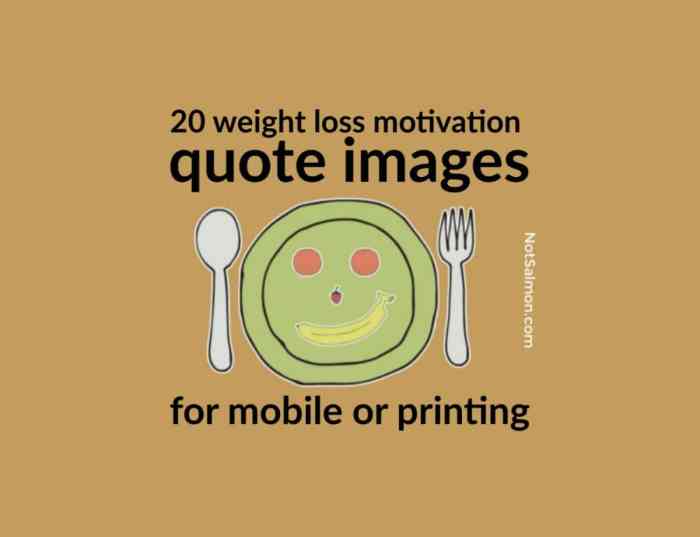Weight Loss Motivation sets the tone for your success story, highlighting the key role motivation plays in achieving your weight loss goals. Dive into the world of intrinsic and extrinsic motivators as we explore strategies to keep you on track and overcome obstacles along the way.
Introduction to Weight Loss Motivation

Weight loss motivation is the driving force that pushes individuals to work towards achieving their weight loss goals. It serves as the fuel that keeps them going, even when faced with challenges or setbacks along the way.
Having strong motivation is crucial in the journey of weight loss because it helps individuals stay focused, disciplined, and committed to making healthy choices. Without motivation, it can be easy to give in to temptations, procrastinate, or lose sight of the end goal.
Significance of Motivation in Weight Loss
When it comes to weight loss, motivation plays a vital role in determining success. It helps individuals stay consistent with their exercise routines, adhere to a balanced diet, and overcome obstacles that may come their way.
- Keeps individuals accountable and committed to their goals
- Boosts confidence and self-esteem
- Provides the drive to push through difficult times
Examples of Motivation Impacting Weight Loss Journeys
There are countless stories of individuals who have achieved remarkable weight loss transformations due to their unwavering motivation. Here are some examples:
- A person who set a goal to run a marathon and lost weight to improve their performance
- Someone who wanted to set a healthy example for their family and lost weight to lead by example
- An individual who overcame health issues by losing weight and regaining their vitality
Types of Motivation
In the realm of weight loss, motivation plays a crucial role in achieving success. There are two main types of motivation that can drive individuals towards their weight loss goals: intrinsic and extrinsic motivation.
Intrinsic Motivation
Intrinsic motivation comes from within oneself and involves pursuing a goal for personal satisfaction, enjoyment, or a sense of accomplishment. When it comes to weight loss, intrinsic motivators can include:
- Improving overall health and well-being
- Boosting self-confidence and self-esteem
- Feeling more energized and active
- Enhancing physical appearance and body image
Extrinsic Motivation
Extrinsic motivation, on the other hand, involves external factors that drive individuals to achieve their weight loss goals. These external factors can influence extrinsic motivation for weight loss, such as:
- Receiving praise and recognition from others
- Participating in weight loss challenges or competitions
- Earning rewards or incentives for reaching weight loss milestones
- Avoiding negative consequences, such as health problems or social stigma
Strategies to Boost Motivation
Staying motivated during weight loss can be challenging, but implementing the right strategies can make a significant difference in your journey. Setting achievable goals, staying accountable, and rewarding yourself are key components to staying motivated throughout the process.
Setting SMART Goals
Setting SMART goals is crucial for maintaining motivation during weight loss. SMART goals are Specific, Measurable, Achievable, Relevant, and Time-bound. By setting clear and specific goals, you can track your progress and stay focused on your objectives. For example, instead of saying “I want to lose weight,” a SMART goal would be “I want to lose 10 pounds in the next 2 months by exercising 4 times a week and eating a balanced diet.”
Reward Systems
Implementing a reward system can help enhance motivation for weight loss. Rewards can serve as incentives for reaching milestones or sticking to your plan. For instance, treat yourself to a spa day, buy yourself a new workout outfit, or enjoy a cheat meal after achieving a specific goal. By rewarding yourself along the way, you create positive reinforcement and make the journey more enjoyable.
Overcoming Challenges: Weight Loss Motivation

When it comes to weight loss journeys, there are common obstacles that can hinder motivation and progress. It’s important to be aware of these challenges and have strategies in place to overcome them. Whether you’re facing plateaus, setbacks, or failures, there are ways to stay motivated and on track towards your goals.
Identifying Obstacles
- Unrealistic expectations: Setting goals that are too ambitious can lead to frustration and loss of motivation. It’s important to set realistic and achievable goals.
- Lack of support: Surrounding yourself with positive and encouraging individuals can make a big difference in staying motivated. Seek support from friends, family, or online communities.
- Emotional eating: Stress, boredom, and other emotions can trigger unhealthy eating habits, derailing your progress. Find alternative ways to cope with emotions, such as exercise or meditation.
Overcoming Plateaus
- Change up your routine: Plateaus are common in weight loss journeys. Try switching up your workout routine or trying new healthy recipes to keep things fresh and challenging.
- Set new goals: If you’ve hit a plateau, set new goals to keep yourself motivated and focused. Whether it’s running a 5k or trying a new fitness class, having something to work towards can reignite your motivation.
- Celebrate small victories: Remember to celebrate the small wins along the way. Whether it’s losing a few pounds or fitting into a smaller size, acknowledging your progress can boost motivation.
Staying Motivated after Setbacks, Weight Loss Motivation
- Learn from failures: Setbacks are a part of any journey. Instead of dwelling on them, use them as learning experiences. Identify what went wrong and make a plan to avoid the same mistakes in the future.
- Practice self-compassion: Be kind to yourself during setbacks. Remember that no one is perfect, and it’s okay to slip up occasionally. Get back on track and keep moving forward.
- Reward yourself: When facing setbacks, it’s important to acknowledge your efforts. Treat yourself to a non-food reward, such as a spa day or a new workout outfit, to stay motivated and focused.
Tracking Progress
Tracking progress is essential in weight loss motivation as it helps individuals stay focused, motivated, and accountable on their journey to achieving their goals. By monitoring and measuring their progress, individuals can see how far they have come, celebrate their achievements, and make necessary adjustments to continue moving forward.
Methods for Tracking Weight Loss Progress
- Keep a food journal to track daily food intake and calorie consumption.
- Use a fitness tracker or app to monitor exercise routines, steps taken, and calories burned.
- Weigh yourself regularly to track changes in body weight and body composition.
- Take progress photos to visually see changes in your body shape and overall appearance.
- Measure your body measurements such as waist, hips, and thighs to track changes in inches lost.
Benefits of Tracking for Staying Motivated and Accountable
- Seeing progress can boost confidence and motivation to continue working towards weight loss goals.
- Identifying trends in tracking data can help individuals make informed decisions about their diet and exercise habits.
- Tracking provides a sense of accountability as individuals are more likely to stick to their plan when they see their progress documented.
- It allows for adjustments to be made based on results, leading to more effective and efficient weight loss progress.
